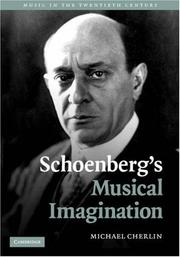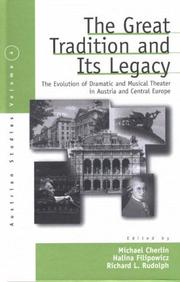| Listing 1 - 7 of 7 |
Sort by
|

ISBN: 9780521851664 0521851661 9780511481987 9780521108348 0511481985 0511289677 9780511289675 9780511290275 0511290276 9786610917082 6610917086 0511289030 9780511289033 0511288352 9780511288357 1107176115 1280917083 0511322232 0521108349 9781107176119 9781280917080 9780511322235 0511287690 Year: 2007 Publisher: Cambridge New York Cambridge University Press
Abstract | Keywords | Export | Availability | Bookmark
 Loading...
Loading...Choose an application
- Reference Manager
- EndNote
- RefWorks (Direct export to RefWorks)
No composer was more responsible for changes in the landscape of twentieth-century music than Arnold Schoenberg (1874-1951) and no other composer's music inspired a commensurate quantity and quality of technical description in the second half of the twentieth century. Yet there is still little understanding of the correlations between Schoenberg's musical thought and larger questions of cultural significance in and since his time: the formalistic descriptions of music theory do not generally engage larger questions in the history of ideas and scholars without understanding of the formidable musical technique are ill-equipped to understand the music with any profundity of thought. Schoenberg's Musical Imagination is intended to connect Schoenberg's music and critical writings to a larger world of ideas. While most technical studies of Schoenberg's music are limited to a single compositional period, this book traces changes in his attitudes as a composer and their impact on his ever-changing compositional style over the course of his remarkable career.
Schoenberg, Arnold,
---
Shenberg, Arnolʹd,
---
Schönberg, Arnold,
---
Schenberg, A.
---
Shenberg, A.
---
שנברג, ארנולד
---
Criticism and interpretation.
---
Composers
---
Music
---
Compositeurs
---
Musique
---
History and criticism
---
Histoire et critique
---
BIOGRAPHY & AUTOBIOGRAPHY
---
MUSIC
---
Composers & Musicians.
---
Individual Composer & Musician.
---
Schönberg, Arnold
---
Schönberg, Arnold.
---
Schönberg, A.
---
Schönberg
---
Schoenberg
---
Šënberg, Arnolʹd
---
Šenberg, Arnol'd
---
Shenberg, Arnolʹd
---
Schönberg, Arnold Franz Walter
---
Schoenberg, Arnold
---
Komponist
---
Maler
---
Dirigent
---
Musiklehrer
---
Künstler
---
Lehrbeauftragter am Stern'schen Konservatorium
---
Berlin
---
Wien
---
Los Angeles, Calif.
---
USA
---
<
Book
ISBN: 1108500714 1108501311 1108501435 1108501559 1108502156 1108501672 131649344X 110714129X 1316506517 1108502032 9781108502030 9781108502153 9781316493441 9781108501675 Year: 2017 Publisher: Cambridge, United Kingdom
Abstract | Keywords | Export | Availability | Bookmark
 Loading...
Loading...Choose an application
- Reference Manager
- EndNote
- RefWorks (Direct export to RefWorks)
Irony, one of the most basic, pervasive, and variegated of rhetorical tropes, is as fundamental to musical thought as it is to poetry, prose, and spoken language. In this wide-ranging study of musical irony, Michael Cherlin draws upon the rich history of irony as developed by rhetoricians, philosophers, literary scholars, poets, and novelists. With occasional reflections on film music and other contemporary works, the principal focus of the book is classical music, both instrumental and vocal, ranging from Mozart to Mahler. The result is a surprising array of approaches toward the making and interpretation of irony in music. Including nearly ninety musical examples, the book is clearly structured and engagingly written. This interdisciplinary volume will appeal to those interested in the relationship between music and literature as well as to scholars of musical composition, technique, and style.
Irony in music. --- Music --- Mozart, Wolfgang Amadeus, --- Schubert, Franz, --- Schubert, Franz --- Schubert, Franz Peter, --- Shu-po-tʻe, --- Shubert, F. --- Shubert, Frant︠s︡, --- Šubertas, F. (Francas), --- Šubertas, Francas Peteris, --- שוברט, פרנץ --- Mozart, Wolfgang Amadeus --- Mozart, Johannes Chrysostomus Wolfgangus Theophilus --- Criticism and interpretation. --- Schumann, Robert, --- Heine, Heinrich, --- Mahler, Gustav, --- Mahler, Gustav --- Maler, Gustav, --- Maler, G. --- Mārā, Gusutafu, --- Heine, Heinrich --- Geĭne, Genrikh, --- Khaĭne, Khaĭnrikh, --- Haine, --- Chaine, Herrikos, --- Hai-nieh, --- Heine, Enrique, --- Heine, H. --- Haineh, Henrikh, --- Haineh, Hainrikh, --- Hainah, Hinrikh, --- Haine, H., --- Heine, Henri, --- Heine, Henryk, --- Heine, Enrico, --- Haine, Hainrix, --- Haine, Hainrikh, --- Heine, Henry, --- Heine, Harry, --- היין, היינריך, --- היינה --- היינה, היינריך --- היינה, היינריך, --- היינה, הינריך --- היינע, היינריך --- היינע, היינריך, --- היינריך, היינה, --- הינה, הינריך --- הינה, הינריך, --- הײנע, הײנע --- הײנע, הײנריך --- הײנע, הײנריך, --- Гейне, Генрихъ, --- Shuman, R. --- Shuman, Robert, --- Schumann, Robert Alexander, --- Mot︠s︡art, Volʹfgang Amadeĭ, --- Mōtsaruto, --- Mot︠s︡art, Iogann-Krizost Volʹfgang Gotlib, --- Mozart, Johann Chrysostom Wolfgang Amadeus, --- Mozart, W. A. --- Mozart, Wolfgango Amadeo, --- Mot︠s︡art, V. A. --- Mocartas, V. A., --- Motsart, Volphnkank Amedaios, --- Mot︠s︡art, Volfang Amadeus, --- Mozzart, Apollo, --- Mozart, Joannes Chrysostomus Wolfgangus Amadeus, --- Mozart, Johannes Chrisostomus Wolfgangus Theophilus, --- Mozhate, --- Моцарт, Вольфганг Амадей, --- מוצרט, --- מוצרט, וולפגנג אמדאוס, --- 莫札特, --- Mozart, Wolfgang Amadeusz, --- Mozart, W.A. --- Mot︠s︡art, Volʹfgang Amadeĭ --- Mot︠s︡art, Iogann-Krizost Volʹfgang Gotlib --- Mozart, Johann Chrysostom Wolfgang Amadeus --- Mozart, Wolfgango Amadeo --- Mocartas, V. A. --- Motsart, Volphnkank Amedaios --- Mot︠s︡art, Volfang Amadeus --- Mozzart, Apollo --- Mozart, Joannes Chrysostomus Wolfgangus Amadeus --- Mozart, Johannes Chrisostomus Wolfgangus Theophilus --- Mozhate --- Моцарт, Вольфганг Амадей --- Mozart, Wolfgang Amadeusz --- Shumann, Robert,
Digital
ISBN: 9781316493441 Year: 2016 Publisher: Cambridge Cambridge University Press
Abstract | Keywords | Export | Availability | Bookmark
 Loading...
Loading...Choose an application
- Reference Manager
- EndNote
- RefWorks (Direct export to RefWorks)

ISBN: 1571814035 9781571814036 1571811737 9781571811738 Year: 2003 Publisher: New York, N.Y. Berghahn
Abstract | Keywords | Export | Availability | Bookmark
 Loading...
Loading...Choose an application
- Reference Manager
- EndNote
- RefWorks (Direct export to RefWorks)
"Both dramatic and musical theater are part of the tradition that has made Austria - especially Vienna - and the old Habsburg lands synonymous with high culture in Central Europe. Many works, often controversial originally but now considered as classics, are still performed regularly in Vienna, Prague, Budapest, or Krakow. This volume not only offers an overview of the theatrical history of the region, it is also a cross-disciplinary attempt to analyse the inner workings and dynamics of theater through a discussion of the interplay between society, the audience, and performing artists."--Jacket.
Music --- Theatrical science --- Austria --- Drama. --- Musical theater --- Musical theater. --- Musiktheater. --- Theater --- Theater. --- History --- Austria. --- Europe, Central. --- Mitteleuropa. --- Österreich.
Book
ISBN: 1886464006 Year: 1994 Publisher: Roxbury Ovenbird press
Abstract | Keywords | Export | Availability | Bookmark
 Loading...
Loading...Choose an application
- Reference Manager
- EndNote
- RefWorks (Direct export to RefWorks)
Book
ISBN: 1782381686 Year: 2004 Publisher: New York, NY : Berghahn Books,
Abstract | Keywords | Export | Availability | Bookmark
 Loading...
Loading...Choose an application
- Reference Manager
- EndNote
- RefWorks (Direct export to RefWorks)
Both dramatic and musical theater are part of the tradition that has made Austria - especially Vienna - and the old Habsburg lands synonymous with high culture in Central Europe. Many works, often controversial originally but now considered as classics, are still performed regularly in Vienna, Prague, Budapest, or Krakow. This volume not only offers an excellent overview of the theatrical history of the region, it is also an innovative, cross-disciplinary attempt to analyse the inner workings and dynamics of theater through a discussion of the interplay between society, the audience, and pe
Book

ISBN: 9781782381686 Year: 2003 Publisher: New York Oxford
Abstract | Keywords | Export | Availability | Bookmark
 Loading...
Loading...Choose an application
- Reference Manager
- EndNote
- RefWorks (Direct export to RefWorks)
| Listing 1 - 7 of 7 |
Sort by
|

 Search
Search Feedback
Feedback About UniCat
About UniCat  Help
Help News
News